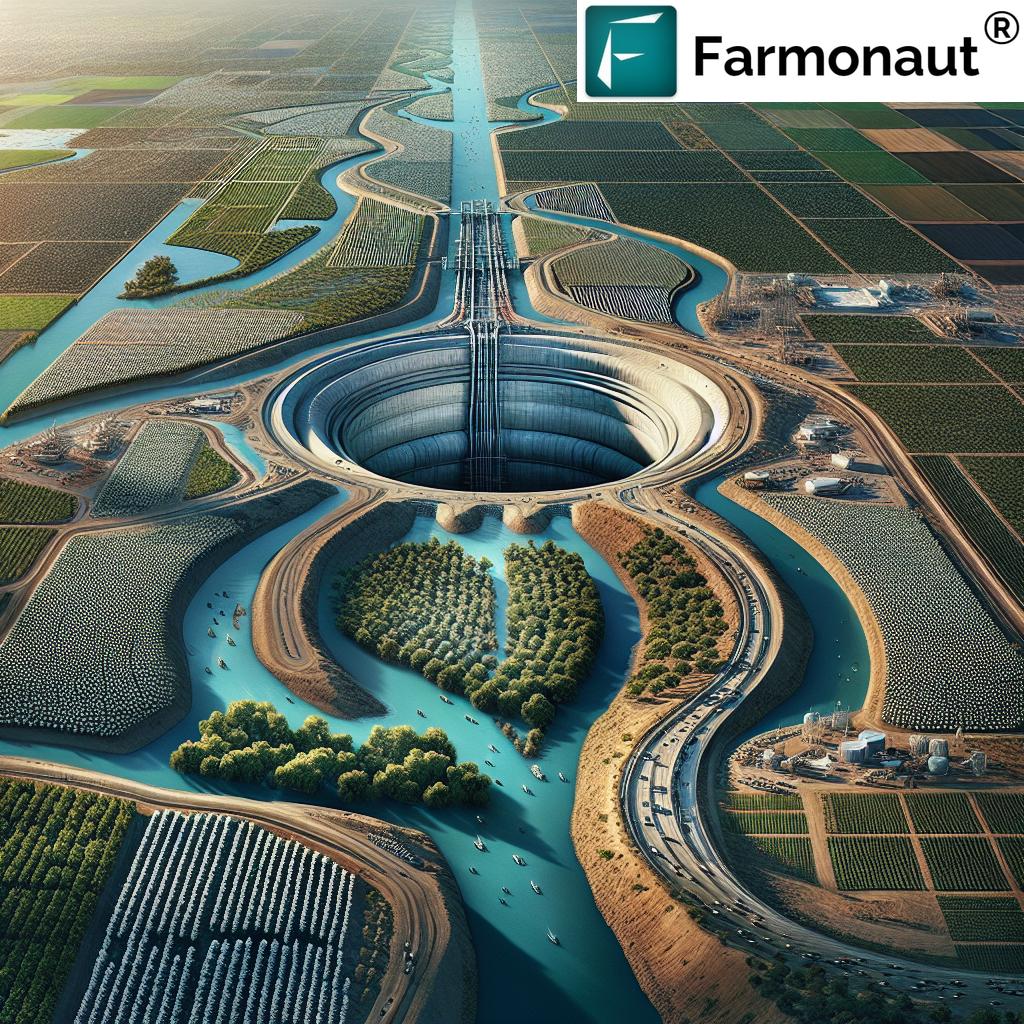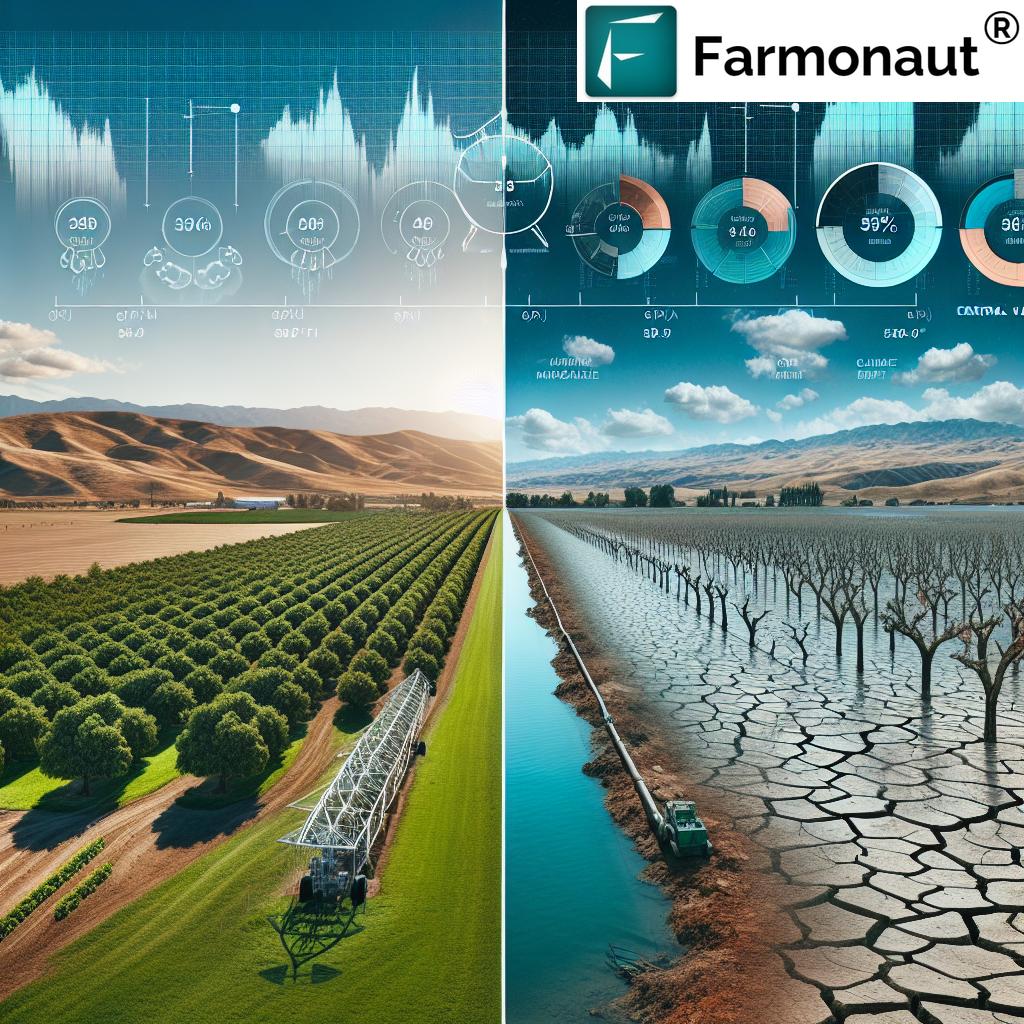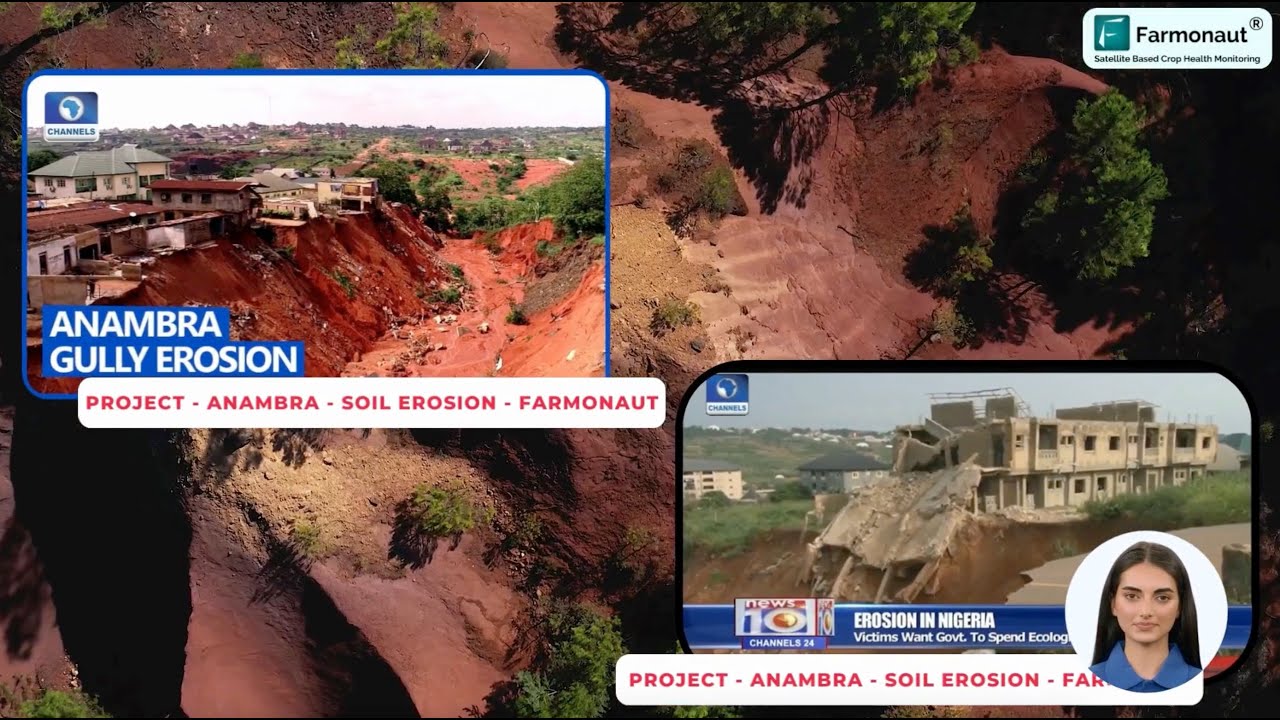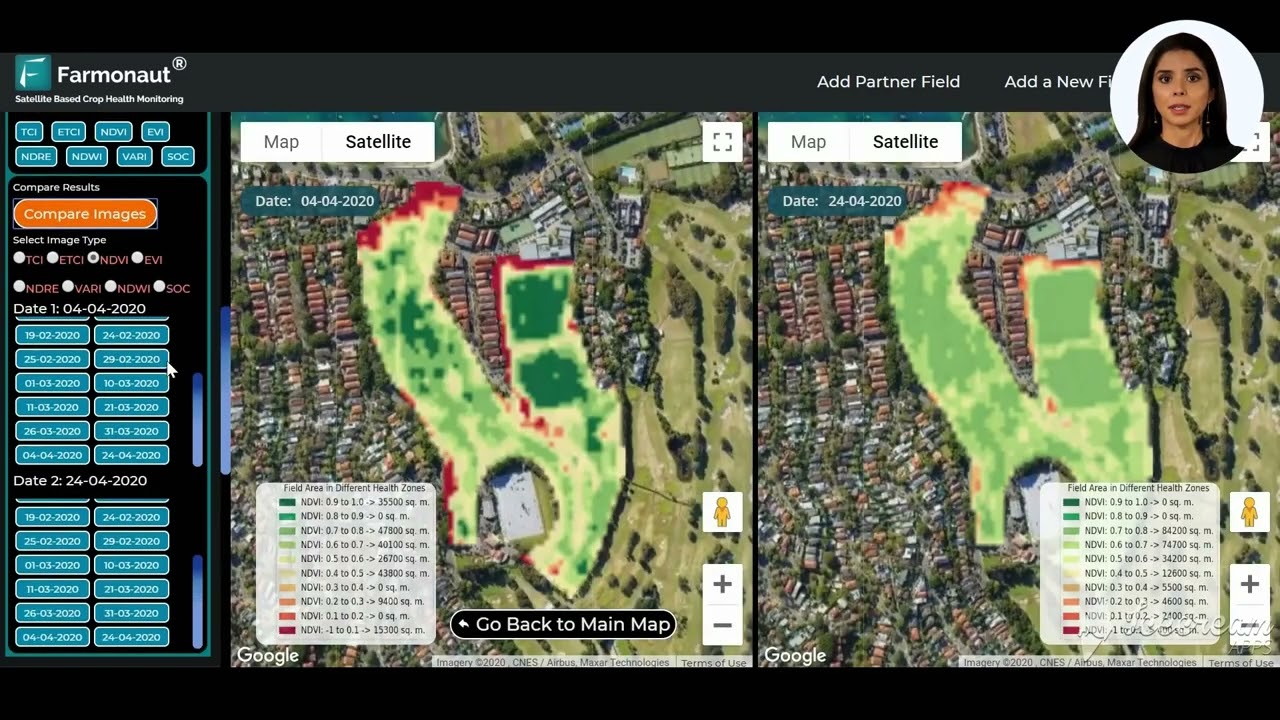California’s Water Crisis: Delta Conveyance Project Sparks Controversy in Central Valley Agriculture
“California’s Delta Conveyance Project impacts water distribution for 27 million people and 750,000 acres of farmland.”
As we delve into the heart of California’s ongoing water crisis, we find ourselves at a critical juncture where the controversial Delta Conveyance Project has ignited a fierce debate over the future of water distribution in the Golden State. This massive infrastructure proposal has far-reaching implications for Central Valley agriculture, Southern California’s water supply, and the delicate ecosystem of the Sacramento-San Joaquin Delta.
In this comprehensive analysis, we’ll explore the multifaceted aspects of this contentious project, its potential impacts on various stakeholders, and the broader implications for California’s water policy. As we navigate through this complex issue, we’ll examine the arguments from both proponents and critics, shedding light on the challenges faced by farmers, environmentalists, and policymakers alike.
Understanding the Delta Conveyance Project
The Delta Conveyance Project, at its core, is a proposed tunnel system designed to modernize water conveyance through the Sacramento-San Joaquin Delta. This ambitious undertaking aims to address several critical issues:
- Improving water supply reliability for millions of Californians
- Enhancing the state’s ability to capture and store water during wet years
- Protecting against the impacts of climate change and sea-level rise
- Upgrading aging infrastructure to meet future water demands
However, the project has become a lightning rod for controversy, with passionate advocates and critics on both sides of the debate. Let’s dive deeper into the key arguments surrounding this transformative proposal.
The Central Valley Perspective: A Fight for Agricultural Survival
For the Central Valley, California’s agricultural heartland, the Delta Conveyance Project represents a potential threat to their way of life. Rep. Josh Harder, a vocal opponent of the project, has introduced the “Stop the Delta Tunnels Act” in an effort to halt its progress. Harder argues that the project would divert precious water resources away from the Central Valley, jeopardizing the region’s agricultural productivity and economic stability.
“We’re introducing a bill called the Stop the Delta Tunnels Act, and it does exactly what it says. It would be the final solution towards this problem,” Harder stated. “My bill would stop this once and for all by essentially making sure that there could be no permit to build the Delta Tunnel. Not now, not ever.”

The Central Valley’s concerns are not unfounded. The region is home to some of the most productive agricultural land in the world, with a diverse array of crops including:
- Almonds and other tree nuts
- Stone fruits such as peaches and plums
- Tomatoes and other vegetables
- Dairy farms and cattle ranches
These agricultural operations depend heavily on a reliable water supply from the Delta. Any reduction in water availability could have devastating consequences for farmers, farmworkers, and the entire agricultural economy of the Central Valley.
Southern California’s Water Needs: A Thirsty Metropolis
On the other side of the debate are the water districts and urban centers of Southern California, which view the Delta Conveyance Project as a crucial investment in the region’s water security. With a growing population and the looming threats of climate change, Southern California faces significant challenges in meeting its future water demands.
Proponents argue that the project will:
- Increase the reliability of water deliveries to Southern California
- Reduce vulnerability to earthquakes and other natural disasters
- Allow for more efficient capture of water during wet years
- Help mitigate the impacts of prolonged droughts
The Department of Water Resources (DWR) maintains that the project is essential for adapting to changing climate conditions. Carrie Buckman, the DWR’s environmental program manager for the Delta Conveyance Project, stated, “Without a Delta Conveyance Project, the part that receives water from the state water project would receive less water into the future because of climate change and sea level rise.”
Environmental Concerns: Balancing Conservation and Water Supply
Environmental groups have raised significant concerns about the potential ecological impacts of the Delta Conveyance Project. The Sacramento-San Joaquin Delta is a unique and fragile ecosystem, home to numerous endangered species and a critical stopover for migratory birds.
Key environmental concerns include:
- Alterations to natural water flows and salinity levels
- Potential harm to fish populations, including endangered Delta smelt
- Disruption of wetland habitats and wildlife corridors
- Increased risk of harmful algal blooms due to changes in water dynamics
Organizations like Restore the Delta argue that the project could exacerbate existing environmental problems in the Delta. Cintia Cortez, a representative of Restore the Delta, stated, “They [water districts] have been irresponsible in managing water and have overdrafted their groundwater supplies. So now they’re looking to the delta to deplete us of that water resource.”
The Role of Climate Change in California’s Water Crisis
Climate change looms large over California’s water landscape, adding urgency to the debate surrounding the Delta Conveyance Project. As the state grapples with more frequent and severe droughts, wildfires, and extreme weather events, the need for a resilient water infrastructure becomes increasingly apparent.
Key climate-related challenges include:
- Reduced snowpack in the Sierra Nevada mountains
- More intense atmospheric river events leading to flooding
- Sea-level rise threatening coastal aquifers and Delta water quality
- Increased evaporation rates from reservoirs and agricultural lands
The Delta Conveyance Project is positioned as a solution to some of these climate-related challenges. By improving the state’s ability to capture and store water during wet periods, proponents argue that it will help California better weather the dry years that are becoming increasingly common.
Groundwater Management: A Critical Piece of the Puzzle
California’s groundwater resources play a crucial role in the state’s water supply, especially during dry years. The Sustainable Groundwater Management Act (SGMA) of 2014 requires local agencies to develop plans for sustainable groundwater management, adding another layer of complexity to the water debate.
The Delta Conveyance Project intersects with groundwater management in several ways:
- Potential impacts on groundwater recharge in the Delta region
- Opportunities for increased groundwater storage in wet years
- Concerns about increased groundwater pumping in areas with reduced surface water deliveries
Critics argue that the project could lead to further depletion of groundwater resources, particularly in the Central Valley where many farmers rely on groundwater to supplement surface water supplies. Proponents counter that improved surface water reliability could actually reduce pressure on groundwater aquifers.
“The Central Valley, affected by the project, produces 25% of the nation’s food, including 40% of fruits and nuts.”
Economic Implications: Weighing Costs and Benefits
The economic implications of the Delta Conveyance Project are vast and complex, touching on multiple sectors of California’s economy. Proponents argue that the project will create jobs, protect the state’s agricultural industry, and secure water supplies for urban economic growth. Critics contend that the costs outweigh the benefits and that alternative water management strategies could be more cost-effective.
Key economic considerations include:
- Construction costs estimated in the billions of dollars
- Potential impacts on agricultural productivity in the Central Valley
- Economic value of increased water supply reliability for Southern California
- Long-term maintenance and operational costs
A thorough cost-benefit analysis is crucial for understanding the true economic impact of the project. The state has released a benefits-cost analysis, but critics argue that it doesn’t fully account for all potential negative impacts.

Political Landscape: A Battle of Interests
The Delta Conveyance Project has become a political battleground, with state and federal lawmakers weighing in on the controversy. Governor Gavin Newsom has thrown his support behind the project, arguing that it’s necessary to modernize California’s water infrastructure and adapt to climate change.
However, opposition remains strong, particularly among representatives from the Central Valley and environmental advocates. The project has also drawn national attention, with former President Trump criticizing California’s water management policies during his administration.
Key political factors include:
- Balancing urban and rural water needs
- Addressing environmental concerns while meeting water demands
- Navigating federal and state regulations
- Securing funding and political support for the project
As the debate continues, the political landscape surrounding the Delta Conveyance Project remains dynamic and contentious.
Technological Solutions: The Role of Innovation in Water Management
While the Delta Conveyance Project represents a traditional infrastructure approach to water management, innovative technologies are playing an increasingly important role in addressing California’s water challenges. From precision agriculture to advanced water recycling systems, technology offers new possibilities for conservation and efficient water use.
At Farmonaut, we’re at the forefront of this technological revolution in agriculture. Our satellite-based crop health monitoring and AI-driven advisory systems help farmers optimize their water use and improve crop yields. By leveraging cutting-edge technology, we’re empowering farmers to make data-driven decisions that conserve water while maintaining productivity.
Some key technological innovations in water management include:
- Satellite-based crop monitoring for precision irrigation
- AI-powered weather forecasting and crop advisory systems
- Advanced water treatment and recycling technologies
- Smart water metering and leak detection systems
These technologies offer complementary solutions to large-scale infrastructure projects, potentially reducing the need for massive water diversions and helping to balance the needs of different water users.
Comparative Analysis: Weighing the Pros and Cons
To better understand the multifaceted implications of the Delta Conveyance Project, let’s examine a comparative analysis of its potential impacts on various stakeholders and environmental factors:
| Stakeholder/Factor | Potential Benefits | Potential Risks |
|---|---|---|
| Central Valley Agriculture |
|
|
| Southern California Water Supply |
|
|
| Environmental Conservation |
|
|
| Groundwater Resources |
|
|
| Climate Change Adaptation |
|
|
This analysis underscores the complexity of the Delta Conveyance Project and the need for a holistic approach to California’s water challenges. As we can see, there are significant trade-offs to consider, and the impacts of the project are likely to be felt differently across various regions and stakeholder groups.
The Way Forward: Seeking Common Ground
As California grapples with its ongoing water crisis, finding a path forward that balances the needs of diverse stakeholders while protecting the environment remains a formidable challenge. The Delta Conveyance Project represents just one piece of a much larger puzzle in the state’s water management strategy.
Moving forward, it’s clear that a multifaceted approach will be necessary. This may include:
- Continued investment in water conservation and efficiency measures
- Exploration of alternative water sources, such as desalination and water recycling
- Adoption of innovative agricultural technologies to reduce water use
- Comprehensive ecosystem restoration efforts in the Delta
- Ongoing dialogue and collaboration between urban and rural water users
At Farmonaut, we believe that technology has a crucial role to play in addressing these challenges. Our satellite-based farm management solutions and AI-driven advisory systems are helping farmers across California and beyond to optimize their water use and improve crop yields. By embracing innovation and data-driven decision-making, we can work towards a more sustainable and resilient water future for all Californians.
Conclusion: A Watershed Moment for California
The Delta Conveyance Project stands as a watershed moment in California’s long and complex relationship with water. As the state faces unprecedented challenges from climate change, population growth, and competing water demands, the decisions made today will shape the future of California’s water landscape for generations to come.
While the debate over the Delta Conveyance Project continues, it’s clear that addressing California’s water crisis will require a combination of innovative infrastructure, advanced technology, and collaborative policymaking. By working together and embracing sustainable solutions, we can strive to create a water system that meets the needs of all Californians while preserving the state’s precious natural resources.
As we move forward, it’s crucial that all stakeholders remain engaged in this vital conversation. The future of California’s water depends on our ability to find common ground, embrace innovation, and make informed decisions based on the best available science and data.
FAQ Section
- What is the Delta Conveyance Project?
The Delta Conveyance Project is a proposed tunnel system designed to modernize water conveyance through the Sacramento-San Joaquin Delta, aiming to improve water supply reliability and adapt to climate change impacts. - How will the project affect Central Valley agriculture?
There are concerns that the project could reduce water availability for irrigation in the Central Valley, potentially impacting agricultural productivity and the region’s economy. - What are the potential benefits for Southern California?
The project aims to increase water supply reliability for Southern California, potentially providing a 15-20% increase in reliable water deliveries and enhancing the ability to capture water during wet years. - What are the main environmental concerns?
Environmental groups worry about alterations to natural water flows, potential harm to fish populations, disruption of wetland habitats, and increased risk of harmful algal blooms. - How does the project address climate change?
The Delta Conveyance Project is designed to help California adapt to climate change impacts by improving water capture during wet periods and enhancing resilience to sea-level rise and extreme weather events.
Earn With Farmonaut: Earn 20% recurring commission with Farmonaut’s affiliate program by sharing your promo code and helping farmers save 10%. Onboard 10 Elite farmers monthly to earn a minimum of $148,000 annually—start now and grow your income!
Learn more about our affiliate program and start earning today!
Explore Farmonaut’s Innovative Solutions
At Farmonaut, we’re committed to empowering farmers with cutting-edge technology to optimize their operations and contribute to sustainable water management. Explore our range of solutions:
For developers interested in integrating our powerful satellite and weather data into their own applications, check out our API and API Developer Docs.
By leveraging Farmonaut’s advanced agricultural technology solutions, farmers can play a crucial role in California’s water conservation efforts while optimizing their crop yields and resource management. Together, we can work towards a more sustainable and water-efficient future for California agriculture.



















